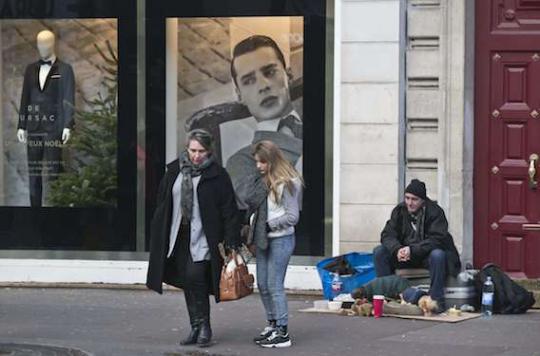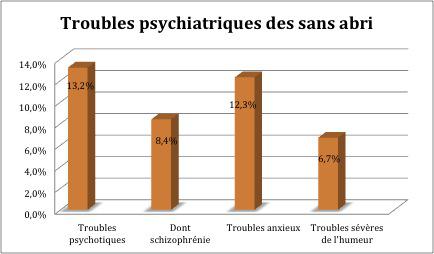The homeless are victims of the double penalty. 31% suffer from severe psychiatric disorders but they are rarely diagnosed. This worsens the comorbidities.

Homeless and often without adequate care. A third of the homeless in Île-de-France suffer from severe psychiatric disorders, according to the Samenta study (MENTAL Health and Addictions among homeless people in the Île-de-France region). This particularly precarious population is rarely diagnosed and therefore poorly managed. However, it would benefit from closer monitoring.
This is what the authors of this work explain in the last Weekly Epidemiological Bulletin (BEH) of the Institut de Veille Sanitaire (InVS).
840 homeless people have agreed to answer questions from investigators and psychologists who sign this publication. Different modules looked at the addictive behaviors of volunteers, as well as their mental health. The sample is predominantly male (65%), to reflect the ratios in the homeless population. If the participants are between the ages of 18 and 82, the average age is 38.
10 times more affected
31.5% of the population suffers from severe psychiatric disorders, conclude the authors. It is much more than the French average. This broad term encompasses psychotic disorders, such as schizophrenia, but also mood or anxiety disorders. And in the case of psychotic disorders, the homeless are 10 times more affected than the general population.
These diseases are often poorly spotted among the homeless. Only 1.5% of psychotic disorders are diagnosed in this population. A failure which is less when the disorders are lighter. Thus, anxiety disorders are identified in 20.4% of cases.

Source : BEH
Disorders coupled with addiction
The question of diagnosis is all the more crucial since, very often, these psychiatric disorders coexist with an addiction. Half of homeless people with psychotic illnesses also exhibit addictive behavior – alcohol in 3 out of 10 cases and cannabis in 3 out of 10. The type of illness increases the risk, multiplied by 4.6 in schizophrenics. This is not the case with anxiety disorder or depression.
The situation is further complicated by the reception conditions, which are often unsuitable for psychiatric disorders. The researchers observed an over-representation in “low-threshold centers”, ie emergency accommodation.
A result which highlights “the flagrant inadequacy of the conditions of accommodation of the sick when it is observed that psychotic homeless people – subject to monitoring which should be particularly attentive, in a stabilized environment – are concentrated in health facilities. ‘most precarious and unstable accommodation’, say the authors. Psychotics represent a population of 2,800 people in Île-de-France. Support and accommodation in “the most populous and richest region of France should not constitute an unattainable political and health objective”, they say.
.















